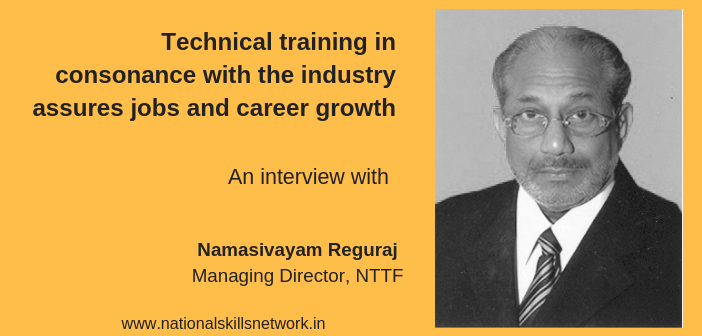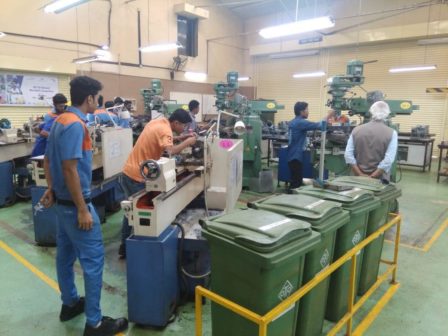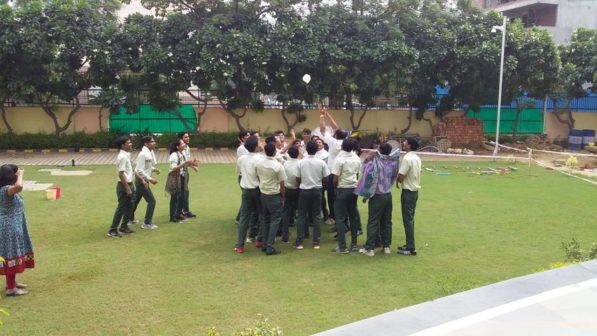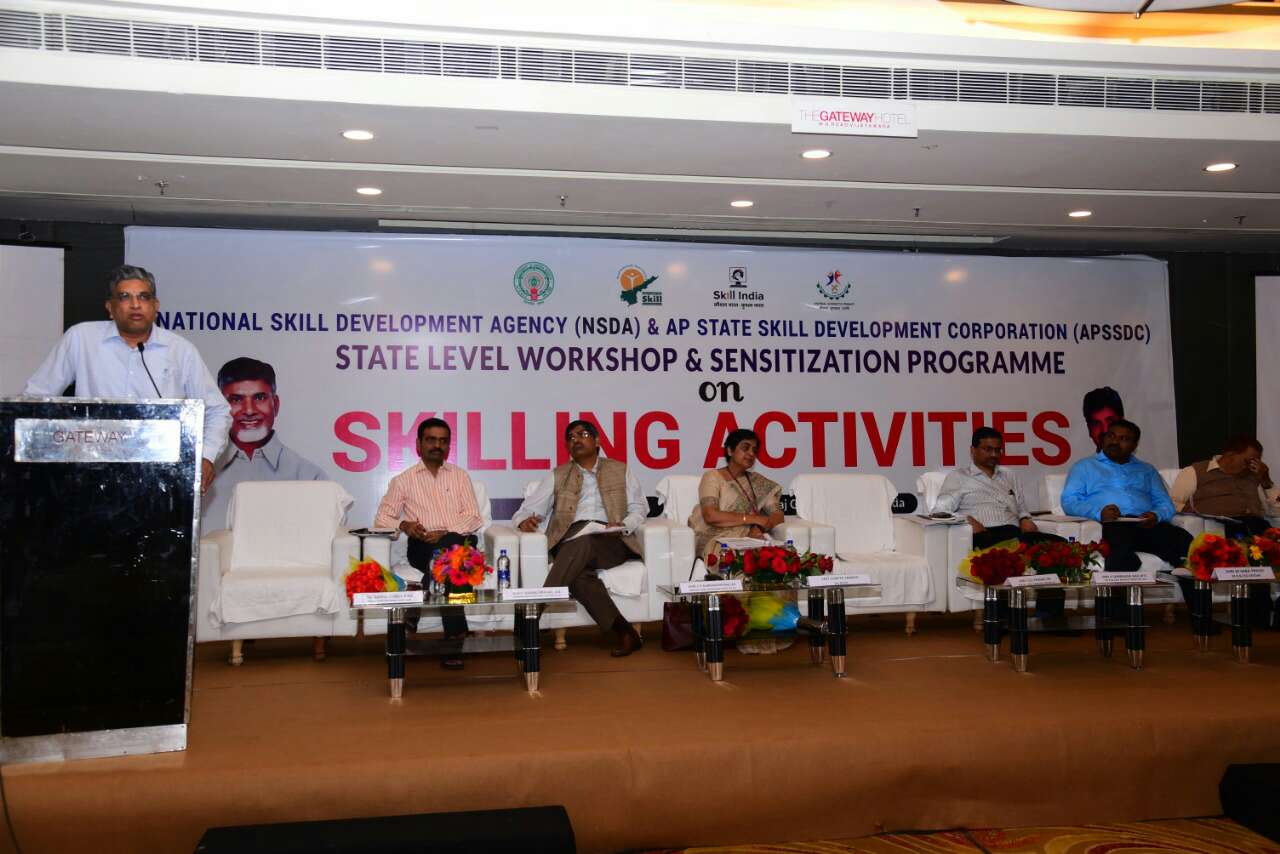Building an institution dedicated to technical training and running it successfully for almost six decades as per global standards, is an incredible achievement. The story of Nettur Technical Training Foundation (NTTF) is closely interlinked with the vision and ideals of Mr Namasivayam Reguraj, Managing Director, NTTF and his team of committed professionals. We are delighted to present an interview with Mr. Reguraj, who has been leading the foundation from 1967 and has played a pivotal role in growth of the institution in many states across India. Read on to learn more about the highly impactful programs from NTTF.
Q: Tell us about the initial days of NTTF and how it has evolved as the most sought-after technical training institution in India.
A: The first center of Nettur Technical Training Foundation was started in Nettur in 1959 as a collaboration between HEKS (Hilfswerk der Evangelischen Kirchen der Schweiz), Switzerland and the Church of South India with the sole objective of providing technical education for underprivileged youth. The training imparted in Tool and Die Making had helped many rural youth support their families.The second center came up in Dharwad in 1964 and since then we have expanded in many states and in 1976 we became a completely self-supporting institution dedicated to making youth employable through technical training. Later, as the industry was growing in India, we continued to make changes to be in sync with the industry, offering courses with in-built apprenticeships, following industry-integrated curriculum.
Today, we are present in 17 locations with multi-disciplinary training programs in disciplines like Tool and Die making, Electronics, Mechatronics, IT, Computer Hardware etc. All the programs are designed as per industry requirements and they are offered as 3-year diploma with work-integrated learning model. At present, there are 10,000 students enrolled for diploma in NTTF in India. Our Post-Graduate Diploma also attracts many graduate engineers and today we have 250 engineers pursuing this program. Most of our Diploma holders also join this program. Our emphasis is on providing hands-on training at the production centers. We have joint ventures with Japan, USA, and Germany that helps us in bringing latest and expensive technology.
 Q: How has NTTF moved along with the industry by understanding their needs and designing the courses accordingly?
Q: How has NTTF moved along with the industry by understanding their needs and designing the courses accordingly?
A: Our Academic Council acts as a watch dog for overseeing our activities they tell us what industry wants. Since the Council includes renowned people from multiple disciplines and walks of life, they guide us to make programs industry-friendly. They also suggest changes as required and enable us to include more disciplines in consonance with industry demands.
 We do not follow the ITI or NCVT curriculum. We follow the Switzerland model of training designed as per global standards. Our curriculum ranks higher than polytechnics and sometimes better than engineering colleges. Since the curriculum is outcome-based, the students can deliver from day-one of the job.
We do not follow the ITI or NCVT curriculum. We follow the Switzerland model of training designed as per global standards. Our curriculum ranks higher than polytechnics and sometimes better than engineering colleges. Since the curriculum is outcome-based, the students can deliver from day-one of the job.
The trainer-student ratio also plays an important role in delivering effective learning outcomes. NTTF has 20 students for 1 trainer for computers and 1:15 ratio for mechanical students. We also use technology quite extensively to monitor the operations at the centers to ensure quality and efficiency. And, we depend heavily on commitment of trainers and other staff members.
My advice to students is simple – “you should choose your love and love your choice!” Feel proud about your jobs as technicians and throw away the stigma attached to such roles. You must excel in your profession and be proud of your vocation. In USA, the ratio between the engineer and the technicians is 1:10 whereas in India it is just the opposite. It’s not just important to learn theory and get a degree. It’s better than doing an engineering course.”
Q: How do you implement skill-based training programs from the government and address issues like student attrition.
A: We have also initiated government skilling programs like PMKVY and DDU-GKY. We are also connected with State Skill Development Missions. Currently, we are delivering such programs from 70 cities. We have also tied up with corporates like Tata Steel and they share the infrastrucutre for training. This gives us the bandwidth to expand our training programs without having to invest in expensive infrastructure.
And, we have taken a conscious decision not to offer very short-term course. We are keen on at least 6 months to 1 year duration. This is because, in the manufacturing industry, we need time to understand things; at least 600 hours are required for understanding the technical manufacturing concepts. Short term courses of about 200 hours may be sufficient for service industry.
For courses like DDU-GKY the challenge is to control dropouts and make them stay on. As a financial incentive, we provide a stipend. If they attend a program and leave at the end of the day they are paid Rs. 100. It’s like the midday meal scheme. It’s better than having a dropout of 50%. So we have been able to control the attrition.
Q: What are some of the challenges in implementing skill-based training programs?
A: While placements are assured for NTTF pass-outs , mobilizing the students remains a challenge! We do everything possible to get the students placed since jobs are assured for every NTTF certified course. Most of our students get hired by MNCs and top ranking Indian companies and they are paid well, so they stay on and attrition is negligible. However, today placement is not a serious issue but mobilising people for joining programs is a bigger issue than training delivery and placement. Our teams adopt various mobilizing strategies and they are in continuous touch with schools and NGOs for encouraging people to join; we also have tie-ups with NGOs to mobilize the students.
Q: How does the Rope-In induction Program help in managing the aspiration of students and their parents?
 A: Parents, students and training providers form three important foundations to build skills. After joining our courses, the students undergo the Rope-In program. This is aimed at homogenising the students and bringing them together for 10-15 days by involving them in many activities. This is a uniquely designed program to help manage aspirations of people, mainly the students and their parents.
A: Parents, students and training providers form three important foundations to build skills. After joining our courses, the students undergo the Rope-In program. This is aimed at homogenising the students and bringing them together for 10-15 days by involving them in many activities. This is a uniquely designed program to help manage aspirations of people, mainly the students and their parents.
- How the program works:
- Manage the aspirations of the people – important, day one take them through what would life be, they come from different walks of life
- Realistic approach and expectations
- Counselling is provided
- Student-friendly approach based on student retention
We bring in parents during the Rope-In session itself. Regular meetings take place between parents, students and teachers. As a part of our awareness program, we show them the safety aspects of our campus. The parents are amazed to see their children’s transformation at the end of the induction. The parents see how their children’s transformation at the end of rope-in stage. For example , when girls come from Uttar Pradesh to join our courses, first we bring their parents, show them the safe environment, thereafter they are our ambassadors. All our students join us through word-of-mouth awareness and recommendation, when they hear our success stories. This is the best form of advertising and it works wonders for us!
Q: NTTF has been pioneering the ‘Learn and Earn’ concept, tell us about how it works.
A: In India, the cost of training of students is borne by the parents. Through ‘Learn and Earn’ the students can become self-reliant . In this program, they work for five days in the industry and one day in our training centre. They get paid by the industry through NTTF, Rs. 10000 per month from day one, not less than minimum wages in that state. Learn and Earn is a 3 years training program. They get a diploma at the end of program and there is no attrition. The entry level is 10th standard or 12th standard as required by the industry. The curriculum is designed by industry and NTTF. At the end of 3 years, the industry can hire or leave them, there is no obligation on the part of student, they can join any company. We do not offer programs where employability is not linked and assured in any way.
Q: As Chairman of Skill Development , CII – Southern Region what is your perspective on national skilling programs and the ITIs?
A: We cannot ignore ITIs when it comes to skilling. We need to make best use of them considering the huge investment that’s gone in from government and private sectors. Though the PPP model under IMC has not done well, we must promote industry support for ITIs where the industry has taken up the responsibility of upgrading them. For example, Maruti has adopted 5 ITIs and they collaborate with us to implement various initiatives. We have a corporate tie-up with Maruti to help improve the ITIs.
We must empower the team at ITIs – the trainers and instructor who impart the skills, the principal and the staff. It is not enough to support them with infrastructure or hardware, we need to help ITIs with good trainers. I have suggested to CII – SR that every state in the southern region can pick up 10 ITIs and NTTF will conduct 10-days program for each group for empowering the trainers. There should be higher concentration on training of trainers and focus on quality. Our aim is to empower existing employees in the ITI centres (principal, Vice principal, convincing them is a challenge) to get them to support the NTTF program. We call them and show them what happens at NTTF which will help them understand better. ITI is like a neglected vessel, it is an asset and it needs to be improved – by empowering the people who man the ship.














Comments 2